I’ve wanted to write about bedrooms for a long time, but it felt like such an enormous topic that I didn’t know how to broach it.
It was reading Alice Hoffman’s novel Practical Magic one morning recently that inspired me to immediately start writing, and then this piece flew out of me. I love the way Hoffman describes spaces, the energy they hold, and the way that energy shifts in response to emotions and happenings and makes itself physically known in peculiar, fantastical ways.
This piece became quite a lot about the end of my time in Russia, which I could write far more about, but still feels too laden with emotion and caught up in the wider political context for it to feel right for me to do so. Somehow this piece led me in that direction, so I indulged that just for a moment.
There is so much to say about bedrooms and I’ve had to reign myself in, but I know that I’ll always return to the subject.
There is magic all bound up with bedrooms. To me, the arrangement of my bedroom has always felt like a spell. Everything is intentional.
I sense that when people come into my bedroom they don’t feel entirely comfortable, although it’s ostensibly a cosy space. They seem loath to sit on the bed or the chair, and instead hover, or settle on the floor. They touch objects, maybe pick them up, then they put them back exactly as they were and we go to the living room to drink and talk, closing the bedroom door behind us. My friends know me well.
When I was a child and shared a room with my little brother at the top of a tall house off Holloway Road, pale yellow walls and blue bunk beds, I spent a lot of time arranging things. I was a materialistic child, but not for all things, rather for strange, specific things, objects which looked as though they had been abandoned; had once known love and no longer did. I loved finding strange little porcelain, wooden or metal animals in charity shops, but I didn’t want to play with them, I just wanted them to feel safe and loved. If I was told that I could not have one of these creatures I would sob uncontrollably, not at the idea that I could not own it, but at the idea that it would be left on the shelf alone. I read Rumer Godden’s entire oeuvre1 religiously, and saw the mournfulness or homesickness she spoke of their tiny features.
Once they were mine, it was very rare that there would be an actual narrative involving these creatures beyond the base connection they shared, but I’d spend hours with them, making them little clothes, constructing spaces which they could curl into the corners of. My childhood bedroom contained many other little bedrooms; nooks and crannies where I would crouch and whisper secrets and words of affirmation to these odd creatures: a miniature bronze hedgehog, the resin mouse netsuke from The Children of Green Knowe2, a bedraggled stuffed owl I’d found on the street. It wasn’t even a question in my mind that they were alive; that they saw things and knew things and felt things, and therefore it was my duty to look after them.
My little brother was, at the time, a source of violent energy. He has since calmed an extraordinary amount, which I would never have expected back then, but when we were children in that Holloway Road house he was a destructive force. He’d wait for me behind doors with wooden swords or sticks and ambush me; try to goad me into some medieval battle of his own creation. As you might imagine, I preferred building the castles to destroying them. We had a big box of blocks made from old train track sleepers. I don’t know where they came from, but they were half splintery, half smooth, made of beautiful chestnut-coloured wood. I of course had favourite bricks, which may have seemed arbitrary to an onlooker but was very well-reasoned in my mind. I’d build gothic arches and castle gardens, sprinkle flowers from the street within their walls to symbolise roses, and then my little brother would launch himself into the midst of it all and it would topple.
My grandmother remembers watching us together in our childhood bedroom, and how impossibly incompatible our ways of inhabiting it were. I needed everything positioned at perfect 90 or 45 degree angles with the surface it was on; he wanted to build a fort out of all the furniture and leave it standing for days on end. My grandmother once told me that observing this made her worried about how I would fare in the wider world, with this particular aspect of my character.
The joy of a bedroom is that it can be a spilling over of your mind which nobody else has to interact with but you. Then, I have discovered, those parts of your mind are less likely to spill over anywhere else.
A couple of times at our Cambridge house parties my attic bedroom became a sanctuary for the more introverted guests. I had this red paper star lampshade which gave out a sort of flattened light, and for some reason made veins extremely prominent. I remember ascending the steps to the attic for a moment away from everything, and discovering a group of intensely veiny ghosts huddling on my bed. They were mostly my friends, but in that moment I was overwhelmed by a kind of anger, and a desperate need for them to leave my space.
Inhabiting a bedroom is a means of self-regulation.
Acknowledge five things you see around you. Tendrils of ivy curling around the bookshelves, votive candles, a box containing a graveyard of broken silver jewellery, Paris metro tickets, leather suitcases on top of the wardrobe.
Acknowledge four things you can touch around you. Dried gypsophila, damp soil, a velvet scarf, a layer of dust.
Acknowledge three things you hear. Distant music, car tyres on wet road, your own breathing.
Acknowledge two things you can smell. The lingering scent of a pomegranate candle, rosemary oil.
Acknowledge one thing you can taste. Cigarette.
I am a very jumpy person. A knock on my bedroom door will always make me leap out of my skin, heart hammering, as if I’ve done something wrong. The crime I have committed, by my brain’s estimation, is lowering my mask; dropping any semblance of performance. This is a very vulnerable place to be. There is a lot to be said for the bedroom as a site of demasking, but this can only be effective if you are sure that you’re truly alone.
To be honest I don’t know what I’m doing in my room most of the time. Very often the activity is the inhabiting itself. My bedrooms have always been an exteriorisation of my character, I suspect because I was a cripplingly shy and extremely quiet child, and this was my way of trying to indicate to people who I was; that I did indeed have deep interests, even though I wasn’t able to talk about them. I suppose I still feel like this, although now it is more for my own gaze than another.
While searching for images for this piece I stumbled across an interview with Florence Welch from a few years ago, and of course, as always, she has already beautifully put into words what I was trying to say above:
Her first bedroom had been decoupaged right up to the ceiling – an attempt to externalise the contents of her head: “I would have been 10. Some girls at school were being mean to me and I just remember sitting at home thinking” — she affects a melodramatic voice — “‘If they would just see this room, they would understand and they would love me!’”
A while ago my girlfriend Yana wrote a piece about the bedroom being “the lyrical museum of memory”3. This idea resonates strongly with both of us, and I think that the fact that we both interact with spaces and objects like this is one of the many things that make us so compatible. Wherever we go we make the spaces our own immediately, covering coffee tables with shells and incense, ephemera and clutter; using coathangers to cover ugly wallpaper with our dresses. Yana can always find an ingenious way to hang clothing so that it becomes part of the decoration.
Once in Tbilisi, over two years ago now, I had fleas in my Airbnb and I texted the host to come and have a look. The Airbnb was two rooms — a large bedroom/living room, and a tiny fluorescently lit kitchen with a bathroom attached — in a wonderfully tumbledown building with a communal balcony crowded with the debris of what once was furniture. The host sent her elderly mother to look at the fleas in place of herself, which I felt quite guilty about. I discovered then that the flat had been in their family for two generations; that the crystal glasses and ugly sculptures in the ubiquitous Soviet glass cabinet were hers, gifts at her wedding and things she had collected on her travels. As she half-heartedly scoured the mattress with her torch she spent more time looking around the room than she did looking at the fleas, which were jumping about in the beam of light. I had hung all of my long vintage floral dresses from the shelves and cupboard doors, so you could barely see the walls, and hidden the sculptures behind anti-war posters I’d propped against empty wine bottles stuffed with waxy yellow church candles. I was momentarily worried that she’d take issue with how thoroughly I had made her family flat my own, but she smiled at me reassuringly and told me, “This room has never looked better.”
Each time Yana and I leave a place, diverging in our wildly separate directions for another long period of time, we do so with suitcases full of peculiar treasures, wrapped up in clothes so they don’t break on the journey. We go back to our dim, warmly lit caves across the world from each other and carefully unwrap each thing and find a place for it, and then send each other photographs. Our bedrooms physically, visually evolve with each adventure we share. After the last time we went to Istanbul, a small silver seahorse in a Paua shell came to rest on my bookshelf, and several black and white photos of Turkish children appeared on the walls.
In Çukurcuma Street in Istanbul, directly next door to the freezing cold Airbnb we once almost burnt down, is Orhan Pamuk’s Museum of Innocence. Yana and I have actually been inside it only three times, but that March we could almost touch its walls from our tiny balcony. We’d stand out there smoking in our cardigans and think about how all of those objects in their glass cases, all of the stories they carry, had been right beside us as we slept.
When I left Russia I had to give away a lot of my things. On the night that it became apparent that I would have to leave, Yana and I stayed up almost all night packing, taking my postcards and photographs off the walls. I remember her standing on my bed collecting all of these things up into a stack, one of the most heartbreaking images I can recall from those few days. I distributed my belongings amongst her friends: incense and candles for Maxim, leather jacket and dresses for Ksyusha, several well-loved plants for the cafe where Yana worked and where we met.
The week before I left I’d found a desk in the rubbish in my apartment courtyard. I’d wanted a desk all winter, mostly for the intensely difficult grammar homework which I felt I couldn’t keep doing on my windowsill, and one had appeared. I bought cherry red paint with Polina at a home store and spent a few days painting it — it had been frozen when I found it and was slightly rotten. The fumes in our windowless kitchen made us all high and giggly.
The paint on that desk was still tacky when we handed over the keys and left the flat for the last time. I apologised to Sergei, the plumber/caretaker with extreme respiratory issues who had been a monosyllabic but ubiquitous figure in our lives those six months, about the presence of the desk, which, as well as still being slightly wet, was now covered in gold-pen drawings of ivy and song lyrics in Cyrillic. He looked really sad when he saw it. “Don’t worry,” he told me. “It can be a piece of you which remains here.” Those were the most words he’d ever said to me at once. I didn’t tell him about the tray full of red paint which I’d stowed away in a plastic bag in some cupboard.
There’s a plastic bag in the wardrobe of my old bedroom at my parents’ house which is full of the ephemera of the months I spent in Russia. I can’t open it; actually can’t even look at it, knowing that seeing those scraps of paper will bring to mind the image of Yana standing on my bed holding them all in her hands. Also in a box inside that wardrobe is the Russian Railway podstakannik (tea glass), which I will always associate with standing by the samovar at the end of the carriage, or drinking taezhnyj chai4 at Stirka after class.
When I first came back from Russia these things stood on a shelf in my childhood bedroom like some kind of shrine. I was the saddest I’ve ever been in those few months, slept on a video call with Yana every night and still kept Russian time, getting up at 4 or 5 in the morning when she went to work, haunting the streets of Oxford like a ghost, smoking Chapman Vanilla in my room with the window barely open and dropping the ash into a shot glass we stole from a restaurant on the Fontanka. I think it’s a sign of how worried my parents were about me that they barely commented on the smoking inside. I didn’t like it when the smoke left the room through the window; wanted it to curl around me and fog my vision like it did in Yana’s kommunalka; liked that when I returned from my daily haunting it greeted me, enveloping me as if I were still in her bedroom on Rubinshteyna.
Putting those objects away was, I think, an important step in escaping the deep melancholia of spring 2022, when I used to consume every single piece of media about the war I came across and cry everywhere: in train stations, in pubs, in the stairwell of some Cambridge party where I had a bad trip and could not comprehend how my former peers were having so much fun while the world was falling apart.
Last winter I went to Paris for a few days and stayed in Lucas’ flat. He had a family emergency and had gone south, so I experienced his living space, the overspill of his mind, without him in it.
Lucas and I met in our favourite underground club in St. Petersburg, in one of the abandoned warehouses in Sevkabel Port, and we really only saw each other there, in the dark, in the fug of smoke and sweat. The first time we met in the daylight was the day he realised he had to leave the country, and I still didn’t know that the next day I would too. We sat at the bar in Stirka and sobbed. Then we went to somebody’s party across the city and did the same. We joked that we were staging fake heterosexual breakups in front of random audiences all night, crying on each other’s shoulders at the bus stop or leaning against the table in a stranger’s apartment. On that bus we passed crowds of police in riot gear; lines of vans ready to take protestors to prison. On that bus we discovered that our cards didn’t work; that we had been cut off from any kind of monetary transaction. The bus stilled outside Gostiny Dvor, where the shouts of protestors only just reached us, but the spines of armed policemen brushed against the window.
In Lucas’ Paris bedroom in December 2023 there was a huge Soviet map of the Leningrad Oblast covering the wall above his bed. I recognised it as one that I also have, found at some flea market, lurking in that plastic bag in my wardrobe. His St. Petersburg State University student ID card sat in a bowl on his coffee table alongside his lighters and many packs of playing cards. Lucas is a magician. In that room it felt as though he was performing some other kind of magic than card tricks; the magic of remembrance and acceptance; the magic of acute nostalgia.
Arranging a room is a sort of magic that can easily become dark. It’s always very apparent to me when something shouldn’t be on the wall or on the shelf, because it taunts me, calls me to look at it and then tells me it is wrong. In every bedroom I’ve ever had there is a box of things I can’t look at. Now it is full of trinkets given to me by someone who I don’t talk to anymore, which carry energy that definitely does not need to to be pervading my life at this moment.
There are, I believe, thirteen effigies of pomegranates in my room. These are my talismans. When I am an old lady I think I’ll be the Pomegranate Lady, the way some old ladies dress only in green or purple and everything in their house is that colour too. I think my house, if I ever have one, will be pomegranate-themed.
I keep all the flowers which have ever been given to me. They either hang face down or stick out of some tiny bottle or other, desiccated, their colours muted. I remember who each one came from, and what the occasion was.
I have two delicate teacups and saucers which will never be drunk from — gifts from Prisca in Lewes lovingly wrapped in newspaper when I dropped by to say hello on the way to the station and discovered that they were clearing out their house.
I have pinecones and pebbles and an art deco crucifix from this past summer in France, which were exposed to the gaze of the entirety of Beziers airport when I had to repack my suitcase.
I have angel wings from when I dressed as Juliet from Baz Luhrmann’s 1996 adaptation for Halloween and almost took out the eyes of the other party guests as I moved.
I have icons from an Istanbul flea market and from my local Orthodox church shop in Georgia, watching over me alongside the Amy Winehouse NME cover (found in Rock n Roll Rescue, Camden) and an image of an angel I dredged up from a skip in the Cambridge suburbs.
All of these things watch over me — my various bedroom saints.
Rumer Godden’s children’s books evoke the confusions, disappointments, secrets and joys of childhood with a concentration on the inner lives of children and their toys. My favourite was Miss Happiness and Miss Flower, a novel about Japanese dolls brought to England. The dolls are homesick and isolated, and find comfort in Nona, a young girl who has been forced to leave behind her life in India. She decides that, in order to help them feel at home, she will construct them an architecturally accurate Japanese house and garden.
The Children of Green Knowe by Lucy M. Boston tells of Green Knowe, an old house surrounded by floodwater, inhabited by the spirits of people who lived there in years passed and supernatural entities (including a living statue of St. Christopher and a demonic tree spirit).
You can read Yana’s piece on bedrooms in both Russian and English in The Cambridge Cult Issue X: Cycles, available to order in print at https://www.thecultcollective.co.uk/
A magical cocktail we drank through the St. Petersburg winter, served in a tea glass with a long silver spoon and made of Jägermeister, Sprite, gingerbread syrup and lemon.
Cover image: Jenna in her room in South London, 2024

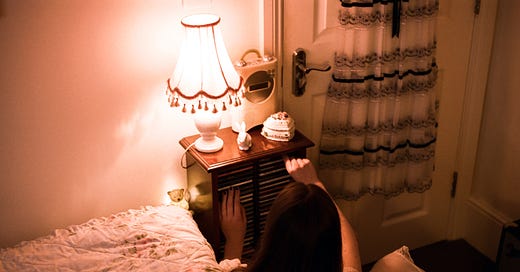




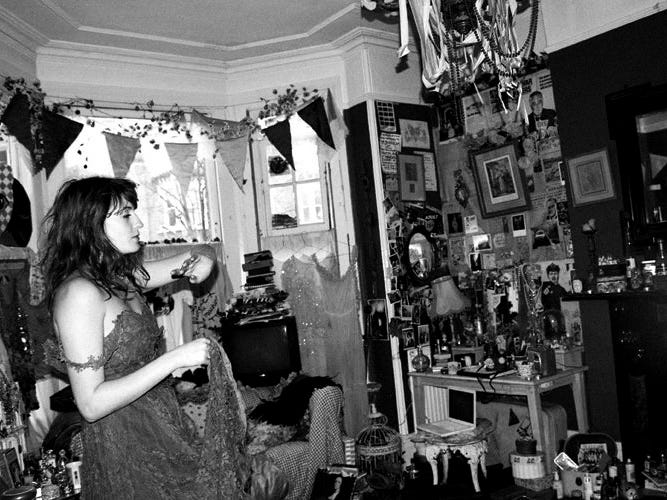
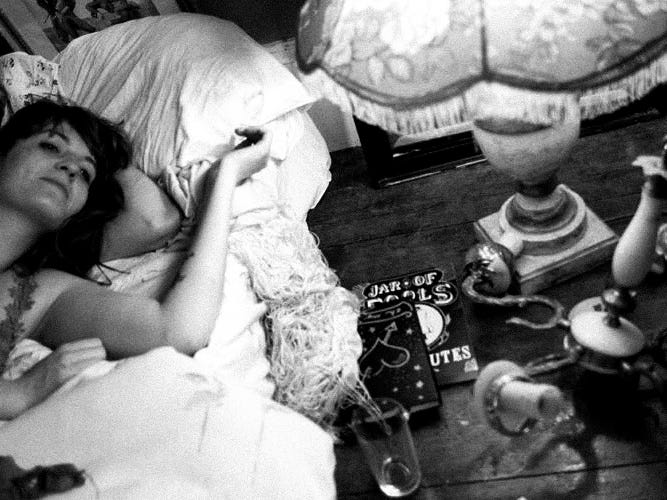


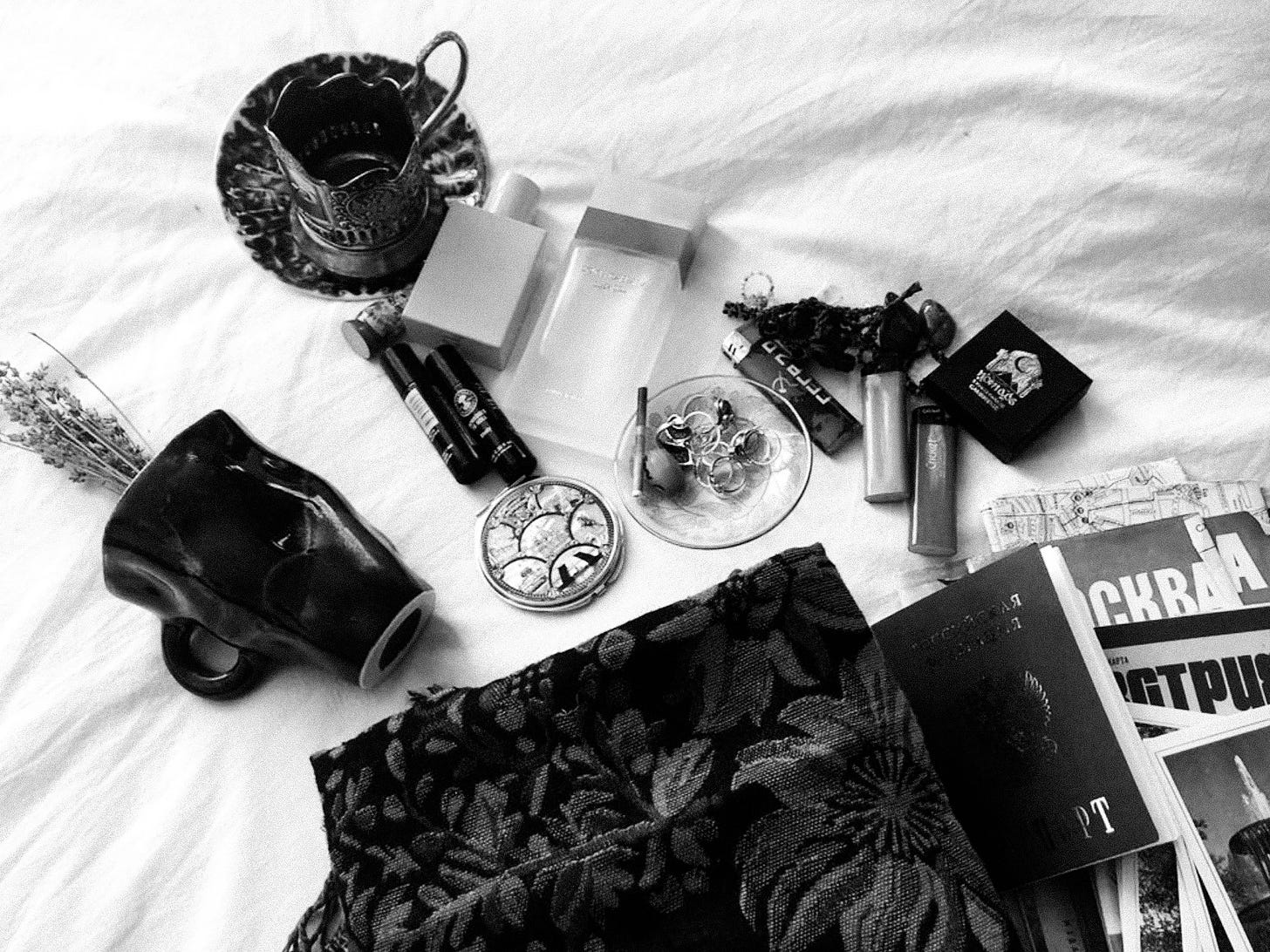
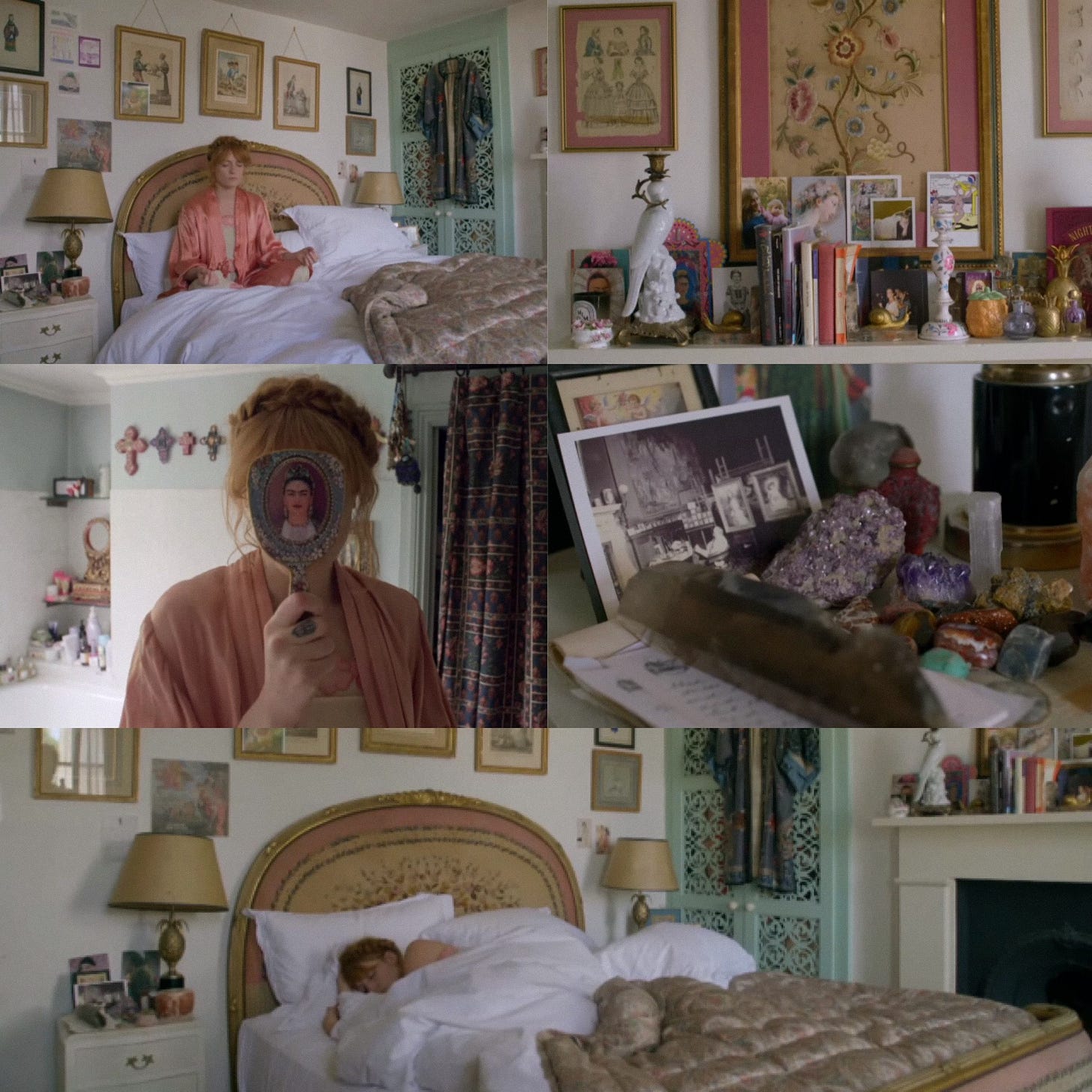

This was electrifyingly good. The pockets of narrative are like the tiniest aperitif one could eat, hardly a forkful - you just, pleadingly, want more. Thank you so much for writing in the way that you do. It is lovely.
i feel so grateful for the privilege of seeing your rooms — feel so strongly they are material repositories of your mind and soul…. <3 beautiful piece